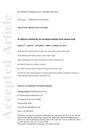 17 citations,
June 2019 in “BMC genomics”
17 citations,
June 2019 in “BMC genomics” Non-coding RNAs help control hair growth in cashmere goats.
 January 2018 in “Elsevier eBooks”
January 2018 in “Elsevier eBooks” The document concludes that alopecia has significant social and psychological effects, leading to a market for hair loss treatments.
 September 2023 in “Deleted Journal”
September 2023 in “Deleted Journal” Post-bariatric surgery patients often face gastrointestinal issues, fatigue, dry skin, hair loss, and anxiety.
 14 citations,
April 2000 in “Animal Science/Animal science”
14 citations,
April 2000 in “Animal Science/Animal science” Nutrients like vitamins, copper, zinc, and amino acids are crucial for healthy hair and wool growth.
 5 citations,
February 2018 in “Experimental Dermatology”
5 citations,
February 2018 in “Experimental Dermatology” Scientists developed a way to isolate sweat glands from the scalp during hair transplants, keeping them alive for 6 days for research and cosmetic uses.
 21 citations,
February 2016 in “Reproductive Biomedicine Online”
21 citations,
February 2016 in “Reproductive Biomedicine Online” The conclusion suggests that PCOS may persist due to genetic traits that, while harmful for female fertility, could have provided survival and reproductive benefits to males.
 78 citations,
August 2002 in “Experimental Dermatology”
78 citations,
August 2002 in “Experimental Dermatology” Researchers developed a quick and easy way to get and grow cells from the base of human hair follicles.
 8 citations,
April 1990 in “Hormone and Metabolic Research”
8 citations,
April 1990 in “Hormone and Metabolic Research” The medication combination did not affect glucose tolerance but increased some cholesterol levels due to its estrogen component.
 21 citations,
April 2011 in “Physiological Research”
21 citations,
April 2011 in “Physiological Research” Normal levels of DHT can reduce belly fat and increase muscle, but too much can lead to hair loss, prostate issues, and possibly heart disease.
 December 2024 in “Frontiers in Neurology”
December 2024 in “Frontiers in Neurology” Testosterone with finasteride improved muscle and bone health in men with spinal cord injury.
 1 citations,
January 2019 in “Elsevier eBooks”
1 citations,
January 2019 in “Elsevier eBooks” Electrospun matrices help regenerate skin and hair follicles using PCL and collagen scaffolds.
 2 citations,
April 2021 in “International Journal of Molecular Sciences”
2 citations,
April 2021 in “International Journal of Molecular Sciences” The study concluded that changing the culture conditions can cause sika deer skin cells to switch from a flat to a 3D pattern, which is important for creating hair follicles.
 36 citations,
June 2014 in “PLOS ONE”
36 citations,
June 2014 in “PLOS ONE” Finasteride, a hair loss drug, may cause long-term sexual side effects due to changes in hormone receptor levels.
 70 citations,
February 2015 in “Expert Opinion on Drug Discovery”
70 citations,
February 2015 in “Expert Opinion on Drug Discovery” Topical drugs and near-infrared light therapy show potential for treating alopecia.
45 citations,
June 2003 in “Journal of Investigative Dermatology Symposium Proceedings” Understanding hair follicles through various models can help develop new treatments for hair disorders.
 41 citations,
June 2016 in “Reviews in endocrine and metabolic disorders”
41 citations,
June 2016 in “Reviews in endocrine and metabolic disorders” Hidradenitis suppurativa may be related to hormones and patients often have metabolic disorders; more research is needed to understand this connection.
 9 citations,
March 2021 in “Hormones”
9 citations,
March 2021 in “Hormones” COVID-19 may affect male fertility and women might have better outcomes due to hormonal and immune differences.
 21 citations,
January 2021 in “Therapeutic Advances in Endocrinology and Metabolism”
21 citations,
January 2021 in “Therapeutic Advances in Endocrinology and Metabolism” Testosterone may have a dual role in COVID-19, potentially worsening outcomes in men, and testosterone therapy could help some patients, but more research is needed.
 8 citations,
December 2022 in “Nature Reviews Endocrinology”
8 citations,
December 2022 in “Nature Reviews Endocrinology” Sex hormones' effects on COVID-19 are unclear and more research is needed to understand their potential as treatment.
 17 citations,
December 2020 in “Journal of Genetic Counseling”
17 citations,
December 2020 in “Journal of Genetic Counseling” Genetic counselors should be culturally skilled and aware of transgender patients' unique health risks and needs.
 23 citations,
September 2021 in “Frontiers in Cellular and Infection Microbiology”
23 citations,
September 2021 in “Frontiers in Cellular and Infection Microbiology” Testosterone's effects on COVID-19 are unclear and need more research.
 9 citations,
November 2021 in “Infectious Agents and Cancer”
9 citations,
November 2021 in “Infectious Agents and Cancer” Androgen deprivation therapy doesn't lower the risk of death from COVID-19 in prostate cancer patients.
 November 2017 in “JAMA internal medicine”
November 2017 in “JAMA internal medicine” Women also use 5α-reductase inhibitors, and their effects differ from men.

Isotretinoin may cause temporary, reversible facial hair growth in some women.
November 2017 in “JAMA internal medicine” Women also use 5α-reductase inhibitors for hair loss and hirsutism.
 98 citations,
December 2008 in “Journal of Investigative Dermatology”
98 citations,
December 2008 in “Journal of Investigative Dermatology” Prolactin affects hair growth and skin conditions, and could be a target for new skin disease treatments.
 20 citations,
January 2021 in “Plants”
20 citations,
January 2021 in “Plants” High energy boosts root hair growth in plants, while low energy stops it.
 69 citations,
February 1983 in “Gut”
69 citations,
February 1983 in “Gut” Men with coeliac disease may have hormone imbalances that could affect sexual function, but these can improve with better gut health.
 166 citations,
October 2018 in “Endocrine Reviews”
166 citations,
October 2018 in “Endocrine Reviews” Hormone treatments for transgender individuals generally improve mental health and physical transition, with some health risks that require medical supervision.
 36 citations,
November 2009 in “Journal of Investigative Dermatology”
36 citations,
November 2009 in “Journal of Investigative Dermatology” Prolactin may affect hair growth differently based on gender and scalp area.




























